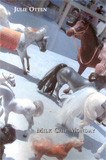 Review by Emme Devonish
Review by Emme Devonish
Pavement Saw Press
P.O. Box 6291
Columbus, OH 43206
ISBN 1-886350-64-7
2006, 84pp., $12.00
www.pavementsaw.org
Julie Otten’s Milk Chip Monday tracks a girl’s life from adolescence to womanhood. Her long narrative poems resemble diary entries. The verses are marked with direct, graphic language, which leaves lasting impressions.
Otten grew up in Springfield, Ohio, spent six years in New York then returned to live in Columbus where she teaches English. Milk Chip Monday is her second full-length book.
Otten’s work inundates the reader with American pop culture references from the 1970s through the present. For example, some of the poems are named after Hollywood icons whether real or fictional: “The Death of Andy Gibb,” “The Death of Keith Partridge,” “The Death of Sean Cassidy,” and “Me and Mo and Julie McCoy.”
Almost all of the other poems contain some reference to celebrities such as Marie Osmond, Jane Seymour, Kristie McNichol, Mia Farrow, Roman Polanski, etc. These endless references to Hollywood stars, even in “Alyce’s Hair,” do not mask the deep-seated pain of the narrator’s life. The rage of the narrator’s voice is consistent throughout the book as the poems reveal an upbringing overshadowed with sexual and physical abuse.
In “Alyce’s Hair,” the poem begins with a girl’s disdain for Alyce’s…
hair the color of a Barbie dipped in baby shit, hair she
attempts to glue to the sides of her head with cereal milk
every morning just to keep it our of her eyes and in the
summer she attracts flying insects drawn to the lure of
Apple Jacks and little girl. Sometimes I pray she gets lice
These childish bouts of jealousy quickly shift into the narrator’s anger towards her parents. The narrator’s mother preferred short hair and stood ready with clippers to chop her daughter’s hair. In defiance the narrator drew pictures in her notebook of women “with swords and breasts and long, long hair . . .” Then she fantasizes that Alyce’s long “blonde tent” will be “pinned under every sweaty guy she wakes up next to.”
When the narrator grows up she argues with her daughter about combing her hair while there is a woman
right now, trapped in her kitchen, where she is trying
to get loose from her drunk boyfriend who has her by
her hair, pulling her ear to his mouth, wrapping her hair
around his fist and gripping her head so she can hear what
he will do to her if he finds out she’s fucking his dad,.
The sexual and physical tensions intensify with each poem. In “A Girl Named Sooner,” the narrator’s recollection of an after-school special turns into a story about a woman who hooks up with a former boyfriend and is ultimately abused.
If you’re a girl like me, you won’t say “yes” or “no.”
You’ll just let it happen, and then he’ll be asking,
“hey, you like it like this?” and there won’t be a
thing you can do about it anymore. You’ll just look
in his face to see if there’s something in there, then
lay back and wonder how you got to be so small,
so feeble. How you’d ever have the guts to get even.
Despite the narrator’s thoughts, the reader wonders if a person can ever get even. There seems to be no escape or hope for the victim in this or other poems. Otten writes:
You’d think about it with your hand on the receiver,
debating whether or not to call the cops. You’d see
the empty glasses and tamped-out butts. You’d see the
bruise setting up on your cheek. And you’d see
The reader does not see. There is no upside.
You’d feel that mud on your shoes, the pull of skin
around that scar when the wind hit it. And then
you’d put the receiver down on its handle for good,
your mouth full of rocks, the sick thud of clipped wings
stammering against your ribs in a dead pulse. You’d
feel the whole, hard weight of your body, buried in stone.
Otten is fearless in her descriptions of broken homes plagued with alcoholism, domestic violence, and even incest. Her images are so vivid that almost every line has the potential to stir a feeling of uneasiness, disgust, or repulsion.
For example, in “The Weekend of Your Father’s Funeral,” the narrator receives a call from a childhood friend and she remembers, “He was a loud man who would come home / after the bars closed and wake the kids” and then he would abuse them. Like the night when
. . . Sissy had come home
late and your father was pissed.
She wasn’t fat then. She was
light enough for your father to
pick up over his head, which he
did before he flung her down the
long set of stairs in front of your
house. There was an ambulance.
All of Otten’s poems tell a story that brings the reader back to the beginning at the end. Each one is complete in itself and there are no loose ends, no mystery, nothing left to the imagination. Her style is distinctive and strong.
Milk Chip Monday is not a book that evokes feelings of understanding, forgiveness, or compassion. The lines are neither musical nor lyrical. The poems are stark reflections of some of the most insidious sides of human nature. Whether confessional or not, the truth is that any of these stories could be true. Indeed, portions of them may be true for any woman.
Comments are closed.